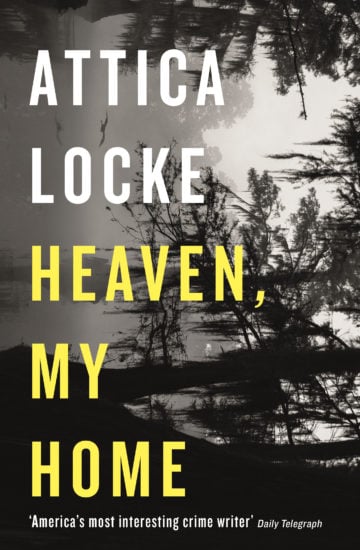Attica Locke’s 2017 detective novel, Bluebird, Bluebird, featuring Texas Ranger Darren Matthews, was a popular and critical success. Now, in the sequel Heaven, My Home, our beloved and tortured protagonist is back, working a new case farther down Highway 59. And is there a better place for dark secrets than an East Texas swamp?
The 9-year-old son of a man serving time for an assault connected to the Aryan Brotherhood has disappeared on Caddo Lake, the shores of which are home to tribal Caddoans and the descendants of enslaved Africans living alongside Confederate flag-waving whites. Ranger Matthews (as he rightly insists on being called if he detects any disrespect) is also on the run from his own professional and domestic demons. His marriage to Lisa, a posh lawyer who prefers him working a desk job, is on the rocks, and his mother is blackmailing him over an unresolved, and potentially career-ending, issue carried over from Bluebird, Bluebird.

A troubled marriage, a missing child, a tormented investigator: These ingredients could’ve resulted in a book full of crime-novel cliches. But thankfully, Locke doubles down on one of the most interesting characters from the trilogy’s first volume—East Texas. It hardly seems possible, considering the complexity with which she rendered Lark, Texas’, musical and culinary culture in Bluebird, Bluebird, but place serves an even larger role in Heaven, My Home. Her atmospheric descriptions (“Spanish moss on the cypress trees dampening all sound” and “knobby roots standing up out of the water like a line of troops keeping outsiders at bay”) would be an artfully creepy backdrop for any mystery, but the setting here is doing much more.
As Ranger Matthews is quick to point out, East Texas is not singular. Caddo Lake was “not his East Texas. It was zydeco where he wanted blues. It was boudin where he wanted hot links …” For the characters mired in the murky circumstances behind the boy’s disappearance, the lake is home, no matter the political and social realities that increasingly complicate life alongside it. Locke explores Caddo Lake’s history—before changes to the Red River caused the water level to fall dramatically, it was a lively commercial waterway filled with steamboats—and the dark underbelly of nearby plantation homes and their quaint bed and breakfasts. As a local historian tells Matthews, the nearby town of Jefferson maintains “… the fiction of bloodless prosperity, an antebellum life of civility and grace—while conveniently forgetting the lives that made this town possible.”
In addition to her high-profile work writing for television shows like Empire, Attica Locke has gained a reputation as a marquee literary chronicler of Texas and the South, particularly the parts and people that usually go unnoticed, and one of the hallmarks of her fiction is the insightful way she explores how black and white people can live almost entirely different experiences inside the same time and place.
Heaven, My Home is set just after the 2016 presidential election, and one of the new realities for Ranger Matthews is the rash of hate crimes across the state—“things they’d never seen in their lifetimes.” Unlike his white colleagues, Matthews doesn’t feel hopeful that the Aryan Brotherhood and their ilk can be easily eradicated: “… in tattoos and neckties, they were out there. Everywhere. The country grew them in secret….“
Locke isn’t exploring cringe-worthy micro-aggressions in this novel; the racism here is blatant and seemingly hard-wired into the fabric of life. Despite Matthews’ authority as a uniformed ranger, some of the characters he encounters treat him as if he’s invisible, creating in him “an odd feeling of dislocation.” One of them says to his face: “Never meant blacks any harm—they’re just not my people, if you know what I mean?” Another tells him, “Nigger Town’s that way,” and whistles like he’s a dog. It isn’t easy to look at the world through Darren’s point of view, but it is powerful and devastatingly real.
As in Bluebird, Bluebird, Matthews is not only confronted with a criminal mystery, but also with larger philosophical questions. In a place rampant with inequality and deep-seated racism, what does it mean to search for a missing white boy who has already started down his father’s path of hate? It is clear that in this world—like in ours—justice is not meted out equally, which leads to age-old quandaries: Is it OK to do a bad thing to get a good result? Or does that make you just as bad?
The novel isn’t perfect—there are unnecessary repetitions, as though Locke doesn’t always trust readers to pick something up the first time, and, though I certainly learned more from reading this than I did from seventh-grade Texas history, there are times when the history lectures feel awkward or inorganic. One doesn’t have to have read the Bluebird, Bluebird to enjoy this sequel, though a newcomer might be confused by some of the relationships that carry over from the first novel.
Ultimately, Heaven, My Home is a novel about secrets: the secret of a boy’s disappearance, the secrets of a community, and perhaps most powerfully, the secrets Matthews and other characters keep even from themselves. It’s a thrilling mystery, yes, but it’s also a powerful meditation on what it means to be human in these frightening times.
Read more from the Observer:
-
Where the Bodies are Buried: In 1910, East Texas saw one of America’s deadliest post-Reconstruction racial purges. One survivor’s descendants have waged an uphill battle for generations to unearth that violent past.
-
Julián Castro’s Climate Plan Addresses Environmental Racism:Other candidates focus on broad policies that affect everyone. That’s undeniably good, but it elides that fact that environmental injustices have historically hurt poor, minority communities the most.
-
Dammed to Fail: An Observer investigation finds that unregulated dams across Texas are increasingly failing—putting people and property in jeopardy.







